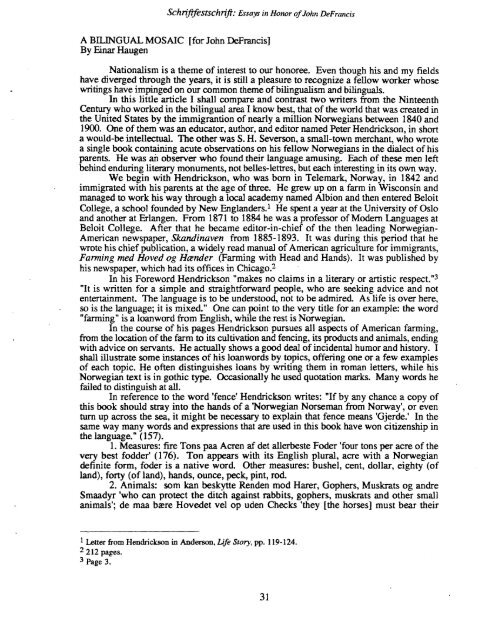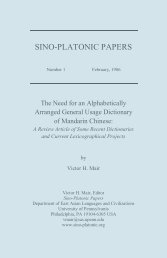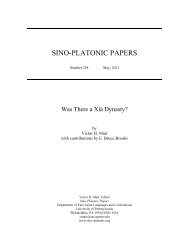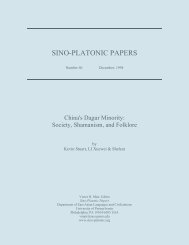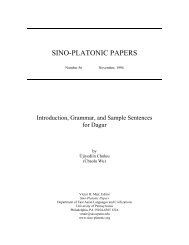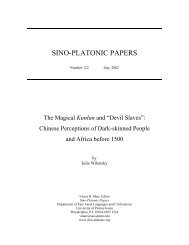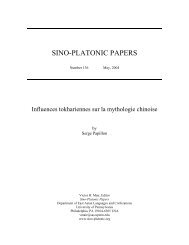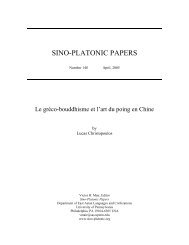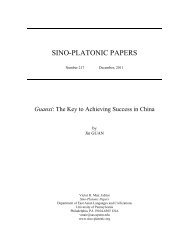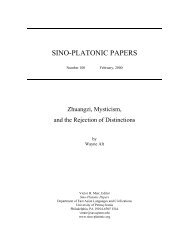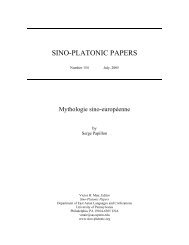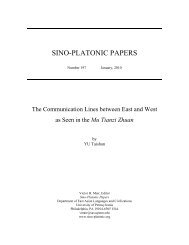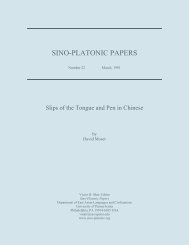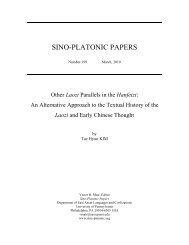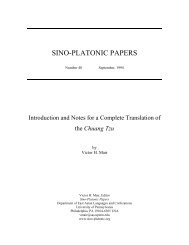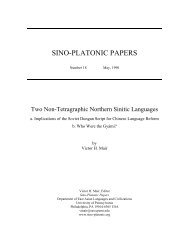Essays on Writing and Language in Honor - Sino-Platonic Papers
Essays on Writing and Language in Honor - Sino-Platonic Papers
Essays on Writing and Language in Honor - Sino-Platonic Papers
Create successful ePaper yourself
Turn your PDF publications into a flip-book with our unique Google optimized e-Paper software.
Schnffe~tt~h rip: Ersayr <strong>in</strong> H<strong>on</strong>or of John DeFrancis<br />
A BILINGUAL MOSAIC [for John DeFrancis]<br />
By E<strong>in</strong>ar Haugen<br />
Nati<strong>on</strong>alism is a theme of <strong>in</strong>terest to our h<strong>on</strong>oree. Even though his <strong>and</strong> my fields<br />
have diverged through the years, it is still a pleasure to recognize a fellow worker whose<br />
writ<strong>in</strong>gs have imp<strong>in</strong>ged <strong>on</strong> our comm<strong>on</strong> theme of bil<strong>in</strong>guahsm <strong>and</strong> bil<strong>in</strong>guals.<br />
h this little article I shall compare <strong>and</strong> c<strong>on</strong>trast two writers from the N<strong>in</strong>teenth<br />
Century who worked <strong>in</strong> the bil<strong>in</strong>gual area I know best, that of the world that was created <strong>in</strong><br />
the United States by the immigranti<strong>on</strong> of nearly a milli<strong>on</strong> Norwegians between 1840 <strong>and</strong><br />
1900. One of them was an educator, author, <strong>and</strong> editor named Peter Hendricks<strong>on</strong>, <strong>in</strong> short<br />
a would-be <strong>in</strong>tellectual. The other was S. H. Severs<strong>on</strong>, a small-town merchant, who wrote<br />
a s<strong>in</strong>gle book c<strong>on</strong>ta<strong>in</strong><strong>in</strong>g acute observati<strong>on</strong>s <strong>on</strong> his fellow Norwegians <strong>in</strong> the dialect of his<br />
parents. He was an obsenrer who found their language amus<strong>in</strong>g. Each of these men left<br />
beh<strong>in</strong>d endur<strong>in</strong>g literary m<strong>on</strong>uments, not belles-lettres, but each <strong>in</strong>terest<strong>in</strong>g <strong>in</strong> its own way.<br />
We beg<strong>in</strong> with Hendricks<strong>on</strong>, who was born <strong>in</strong> Telernark, Norway, <strong>in</strong> 1842 <strong>and</strong><br />
immigrated with his parents at the age of three. He grew up <strong>on</strong> a farm <strong>in</strong> Wisc<strong>on</strong>s<strong>in</strong> <strong>and</strong><br />
managed to work his way through a local academy named Albi<strong>on</strong> <strong>and</strong> then entered Beloit<br />
College, a school founded by New Engl<strong>and</strong>ers.' He spent a year at the University of Oslo<br />
<strong>and</strong> another at Erlangen. From 1871 to 1884 he was a professor of Modem <strong>Language</strong>s at<br />
Beloit College. After that he became echtor-<strong>in</strong>-chief of the then lead<strong>in</strong>g Norwegian-<br />
American newspaper, Sk<strong>and</strong><strong>in</strong>aven from 1885- 1893. It was dur<strong>in</strong>g this period that he<br />
wrote his chief publicati<strong>on</strong>, a widely read manual of American agriculture for immigrants,<br />
Fann<strong>in</strong>g med Hoved og H~nder (Farm<strong>in</strong>g with Head <strong>and</strong> H<strong>and</strong>s). It was published by<br />
his newspaper, which had its offices <strong>in</strong> Chicago?<br />
In his Foreword Hendricks<strong>on</strong> "makes no claims <strong>in</strong> a literary or artistic respe~t."~<br />
"It is written for a simple <strong>and</strong> straightforward people, who are seek<strong>in</strong>g advice <strong>and</strong> not<br />
enterta<strong>in</strong>ment. The language is to be understood, not to be admired. As life is over here,<br />
- so is the language; it is mixed." One can po<strong>in</strong>t to the very title for an example: the word<br />
"farm<strong>in</strong>gw is a loanword from English, while the rest is Norwegian.<br />
In the course of his pages Hendricks<strong>on</strong> pursues all aspects of American fann<strong>in</strong>g,<br />
from the locati<strong>on</strong> of the farm to its cultivati<strong>on</strong> <strong>and</strong> fenc<strong>in</strong>g, its products <strong>and</strong> animals, end<strong>in</strong>g<br />
with advice <strong>on</strong> servants. He actually shows a good deal of <strong>in</strong>cidental humor <strong>and</strong> history. I<br />
shall illustrate some <strong>in</strong>stances of his loanwords by topics, offer<strong>in</strong>g <strong>on</strong>e or a few examples<br />
of each topic. He often dist<strong>in</strong>guishes loans by writ<strong>in</strong>g them <strong>in</strong> roman letters, while his<br />
Norwegian text is <strong>in</strong> gothic type. Occasi<strong>on</strong>ally he used quotati<strong>on</strong> marks. Many words he<br />
failed to dist<strong>in</strong>guish at all.<br />
In reference to the word 'fence1 Hendricks<strong>on</strong> writes: "If by any chance a copy of<br />
this book should stray <strong>in</strong>to the h<strong>and</strong>s of a 'Norwegian Norseman from Norway1, or even<br />
turn up across the sea, it might be necessary to expla<strong>in</strong> that fence means 'Gjerde.' In the<br />
same way many words <strong>and</strong> expressi<strong>on</strong>s that are used <strong>in</strong> this book have w<strong>on</strong> citizenship <strong>in</strong><br />
the language." (157).<br />
1. Measures: fire T<strong>on</strong>s paa Acren af det allerbeste Foder 'four t<strong>on</strong>s per acre of the<br />
very best fodder' (176). T<strong>on</strong> appears with its English plural, acre with a Norwegian<br />
def<strong>in</strong>ite form, foder is a native word. Other measures: bushel, cent, dollar, eighty (of<br />
l<strong>and</strong>), forty (of l<strong>and</strong>), h<strong>and</strong>s, ounce, peck, p<strong>in</strong>t, rod.<br />
2. Animals: som kan beskytte Renden mod Harer, Gophers, Muskrats og <strong>and</strong>re<br />
Smaadyr 'who can protect the ditch aga<strong>in</strong>st rabbits, gophers, mushits <strong>and</strong> other small<br />
animals'; de maa bzre Hovedet vel op uden Checks 'they [the horses] must bear their<br />
Lena from Hendricks<strong>on</strong> <strong>in</strong> Anders<strong>on</strong>, Life Story, pp. 119-124.<br />
212 pages.<br />
3 Page 3.


